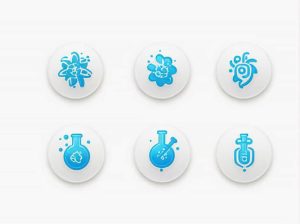Zinc (Zn) is a vital trace element that plays a crucial role in numerous biological functions. One of its most important functions is acting as an enzyme activator enhancing the activity of various enzymes that regulate metabolism DNA replication and immune response.
This topic explores the role of zinc as an enzyme cofactor the specific enzymes it activates and its significance in human health.
How Zinc Functions as an Enzyme Activator
1. Zinc as a Cofactor
Zinc is essential for the structure and function of many enzymes. It acts as a cofactor which means it binds to enzymes and enhances their activity. Without zinc these enzymes would be inefficient or non-functional.
There are two main ways in which zinc activates enzymes:
- Structural Role: Zinc helps maintain the enzyme’s shape and stability.
- Catalytic Role: Zinc participates directly in the enzyme’s chemical reactions.
2. Metalloenzymes and Zinc-Dependent Enzymes
Enzymes that require zinc for their activity are called metalloenzymes. Zinc is often bound in the enzyme’s active site where it helps facilitate biochemical reactions.
Key Enzymes Activated by Zinc
1. Carbonic Anhydrase
Function: Converts carbon dioxide (CO₂) into bicarbonate (HCO₃⁻) and vice versa maintaining acid-base balance in the body.
Importance:
- Regulates blood pH.
- Helps in respiration by facilitating CO₂ transport.
- Found in red blood cells kidneys and the brain.
2. Alcohol Dehydrogenase (ADH)
Function: Converts ethanol into acetaldehyde during alcohol metabolism.
Importance:
- Helps detoxify alcohol in the liver.
- Plays a role in breaking down retinol (vitamin A) for vision.
- Requires two zinc ions per enzyme molecule.
3. Alkaline Phosphatase (ALP)
Function: Removes phosphate groups from molecules aiding in metabolism.
Importance:
- Supports bone mineralization by providing phosphate.
- Essential for liver function and digestion.
- High ALP levels can indicate bone or liver diseases.
4. DNA and RNA Polymerases
Function: Help synthesize DNA and RNA ensuring genetic material replication and repair.
Importance:
- Essential for cell division and growth.
- Critical for wound healing and immune function.
- Zinc deficiency can impair DNA synthesis leading to slow growth and weakened immunity.
5. Superoxide Dismutase (SOD)
Function: Protects cells from oxidative stress by neutralizing superoxide radicals (O₂⁻).
Importance:
- Prevents cell damage and aging.
- Reduces the risk of chronic diseases like cancer and neurodegeneration.
- Works together with copper (Cu-Zn SOD) for antioxidant defense.
6. Carboxypeptidase
Function: Breaks down proteins by removing amino acids from the ends of peptide chains.
Importance:
- Crucial for digestion and protein metabolism.
- Involved in hormone processing and neurotransmitter regulation.
- Found in the pancreas and intestines.
7. Metallothioneins
Function: Regulate zinc and metal ion storage detoxifying heavy metals like lead and mercury.
Importance:
- Protects against metal toxicity.
- Helps in immune system function.
- Assists in wound healing and tissue repair.
Biological Importance of Zinc-Enzyme Activation
1. Zinc and Metabolism
Zinc-dependent enzymes are involved in:
- Protein digestion and synthesis.
- Carbohydrate metabolism (helps regulate insulin function).
- Fat metabolism aiding in energy production.
2. Zinc and Immune Function
- Activates thymulin an enzyme needed for T-cell development.
- Strengthens immune response against infections.
- Helps produce antibodies and white blood cells.
3. Zinc and Brain Function
- Essential for neurotransmitter activity improving memory and learning.
- Supports synaptic transmission in the brain.
- Zinc deficiency is linked to depression and cognitive decline.
4. Zinc and Wound Healing
- Activates enzymes involved in tissue repair.
- Promotes collagen formation for skin regeneration.
- Reduces inflammation and bacterial infections in wounds.
Factors Affecting Zinc’s Role in Enzyme Activation
1. Zinc Deficiency
A lack of zinc can impair enzyme activity leading to:
- Weak immune response (higher risk of infections).
- Slow wound healing and skin disorders.
- Delayed growth and development in children.
- Cognitive issues such as poor memory and concentration.
2. Excess Zinc Intake
Too much zinc can inhibit other essential minerals like copper leading to:
- Weakened immune function.
- Nausea vomiting and stomach pain.
- Interference with iron absorption causing anemia.
3. Dietary Sources of Zinc
To maintain optimal enzyme activation consume zinc-rich foods such as:
- Meat and seafood (beef chicken oysters shrimp).
- Dairy products (milk cheese yogurt).
- Nuts and seeds (pumpkin seeds cashews almonds).
- Legumes and whole grains (chickpeas lentils quinoa).
Medical Applications of Zinc-Enzyme Activation
1. Zinc Supplements for Enzyme Deficiency
- Used to treat zinc-deficiency-related diseases.
- Helps with wound healing immune support and growth in children.
2. Zinc in Disease Prevention
- Protects against oxidative stress and aging-related disorders.
- Reduces the severity of common cold symptoms.
- Supports blood sugar regulation in diabetics.
3. Zinc-Based Medications
- Used in anti-inflammatory creams for skin conditions.
- Included in antiviral drugs for boosting immune defense.
- Part of fertility treatments due to its role in sperm production.
Future Research on Zinc and Enzyme Activation
Scientists are exploring:
- Zinc-based therapies for neurological disorders like Alzheimer’s disease.
- The role of zinc in cancer prevention and treatment.
- Genetic studies on how zinc-dependent enzymes affect aging and longevity.
Zinc is a crucial enzyme activator that supports metabolism immune defense brain function and wound healing. It plays a fundamental role in various biological processes by activating key enzymes like carbonic anhydrase alcohol dehydrogenase alkaline phosphatase and superoxide dismutase.
A balanced zinc intake through diet or supplements ensures proper enzyme activity and overall health. As research continues the potential medical applications of zinc in treating diseases and promoting longevity will become even more significant.


